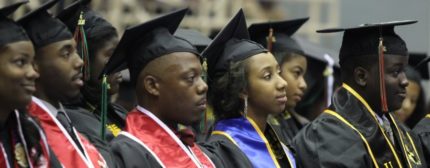
The inescapable conclusion of the study by the Center for Economic and Policy Research is that race plays a disturbingly large role in a new graduate’s ability to find a job. The report revealed even in the so-called STEM fields, Black graduates are having a hard time compared to graduates of other races. Between 2010 and 2012, 10 percent of Black college graduates with engineering degrees and 11 percent of those with math and computer-related degrees were unemployed, compared with 6 percent of all engineering graduates and 7 percent of all those who focused their studies on math and computers.
“We absolutely aren’t trying to discourage people from going to college,” said John Schmitt, a senior economist at the Washington-based Center for Economic and Policy Research who coauthored the study. “College degrees do have value. But what we are trying to show here is that this is not about individuals, or individual effort. There is simply overwhelming evidence that discrimination remains a major feature of the labor market.”
Black college graduates are also plagued by underemployment — working in jobs that don’t require a four-year degree. According to the report, that number has jumped since 2007 by 10 percentage points, to 56 percent—compared to 45 percent for all college graduates.
While Black unemployment has traditionally been double that of whites, the study shows how bad the numbers are even for those who earn bachelor’s degrees.
“This study — its findings, as terrible as they are — honestly should not come as a shock to anyone who is willing to face the truth about employment and unemployment in the United States,” said Nancy Ditomaso, a professor at Rutgers University who studies inequality and organizational diversity and wrote the 2013 book, “The American Non-Dilemma: Racial Inequality Without Racism.”
In an appearance on NPR, Ditomaso said her research suggests a big reason Blacks still lag behind whites in employment is because most people get jobs from personal contacts and connections.
“One of the startling things that I found was that 99 percent of the people that I talked to got 70 percent of the jobs that they held over their lifetimes with getting some kind of help from family, friends, acquaintances, in terms of getting inside information, having someone use influence on their behalf, or someone who could actually offer them a job or an opportunity,” she said in an appearance on Michel Martin’s show, “Tell Me More.”
“When you have almost every job that people get over their lifetimes with that kind of inside help, it raises questions about what actually is the job market, if most jobs, in fact, are not available to just anyone out there, but is available to primarily someone who has an inside edge,” Ditomaso said. “Most people get jobs because whites are helping other whites get jobs, as opposed to trying to keep Blacks out of jobs—at least in the post-civil rights period. And that difference is very important because discriminating or excluding people from jobs is illegal. But helping friends or family members or acquaintances get a job is not illegal.”
“I think that everyone tries to help their family and friends to the extent that they can do so—non-whites as well as whites. But because whites on average disproportionately hold better jobs with more authority, jobs that provide more benefits, training opportunities and so on, when whites are primarily helping other whites, that obviously gives them disproportionate advantages compared to those that don’t have those kinds of connections,” she said.
Ditomaso said her research has found that Blacks may also be less willing to help each other.
“Some of that research has found that Blacks don’t help each other as much as one might expect, not so much because they think of it as favoritism. Some of the research has suggested perhaps because they might feel somewhat more vulnerable; if they help a friend get a job and that friend doesn’t do well, then it might reflect badly on them,” she said.


